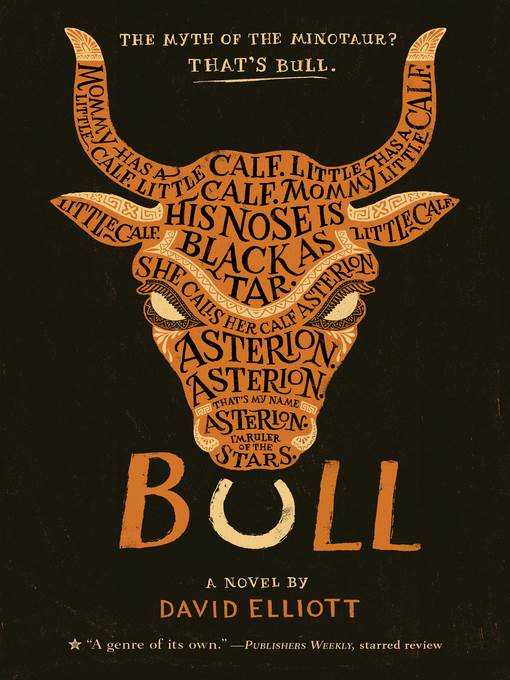
Bull
فرمت کتاب
ebook
تاریخ انتشار
2017
Lexile Score
600
Reading Level
2-3
ATOS
4.3
Interest Level
9-12(UG)
نویسنده
David Elliottناشر
HMH Booksشابک
9781328698933
کتاب های مرتبط
- اطلاعات
- نقد و بررسی
- دیدگاه کاربران
نقد و بررسی

Starred review from April 24, 2017
Using the cadences and unfiltered directness of rap, Elliott (Nobody’s Perfect) tells the Greek myth of the Minotaur in the seven distinct voices of Poseidon, King Minos, Queen Pasiphae, her half-man/half-bull son Asterion, his sister Ariadne, Daedalus, and—in a minor but critical role—Theseus, prince of Athens and, possibly, Poseidon’s son. The story unfolds in interior monologues, each in a different poetic form, which the author deconstructs in one of two closing notes. All are heard by Poseidon, who comments and adds background: “And rather than be called a slut/ She said I was the father of her mutt./ (You humans tend to be less catty/ When an immortal is the daddy).” Everybody knows how this myth ends, yet Asterion’s final words still resonate: “Hell is the freezing/ scorn for who you are/ that transforms a faultless boy/ to Minotaur.” Elliott contemporizes the ancient story of blackmail, betrayal, and revenge with humor, poignancy, and profanity. Hamilton comparisons are unavoidable, yet the personalities and voices Elliott brings to these mythical characters make this powerful and engrossing book a genre of its own. Ages 14–up. Agent: Kelly Sonnack, Andrea Brown Literary.

Starred review from December 15, 2016
A saucy, brash retelling of the Greek myth of the Minotaur. In a series of dramatic monologues with no settings, Elliott updates the voices of Poseidon, Minos, Daedalus, Pasiphae, Asterion, and Ariadne, each in its own poetic form. Poseidon dominates in word count and attitude: if "[y]ou think a god should be more refined? / ... / Never / Bawdy / Raunchy / Racy / Rude? / News Flash: / You don't want a god. / You want a prude." Angry at king Minos, he considers direct revenge ("Boils! / Scabs! / Gills! / A snout! / [Turn] his / Ding-dong / Inside / Out!") but instead gives Queen Pasiphae "a thing / For the white bull's thang." Asterion the Minotaur is born. He grows to age 17, bleakly miserable, tortured by Minos, finally imprisoned in the iconic maze; even his sister Ariadne can't break him out, and eventually he falls to Theseus. Poseidon considers Minos "a dick! / But also so much fun to hate"; some readers will think exactly that about Poseidon too, while others will resent just how much fun Poseidon is to hate, given his misogynistic women-are-crazy/women-are-whores snark about Pasiphae, whose woes he literally created himself. Elliott's absolutely magnetic rhythms will wake up any high school class, and the book could also work as a play. Irresistible, slick, and sharp (no bull!)--with plenty of bull to dissect. (cast of characters, author's notes) (Verse fiction. 14 & up)
COPYRIGHT(2016) Kirkus Reviews, ALL RIGHTS RESERVED.

February 1, 2017
Gr 9 Up-In this retelling of the Greek myth of the Minotaur, the familiar characters illustrate their viewpoints in verse. The story begins with Poseidon as the powerful mastermind behind the famous events that are prompted by King Minos's hubris: Minos's wife is impregnated by a bull and gives birth to Asterion, half-man/half-bull. Once Asterion reaches the age of 17, the narrative shifts to present tense, when King Minos orders that a labyrinth be built to imprison Asterion. Asterion's 15-year-old sister, Ariadne, attempts to rescue him, but instead she succumbs to attractive Theseus, who has been sent to kill the Minotaur. Elliott's contemporary take on the classic myth incorporates modern slang, profanity, and a bawdy sense of humor into an accessible, highly entertaining, and original novel. The characters are given a sense of humanity not found in the original tales; the young adults, for example, are afforded impetuousness, ignorance, easy trust, arrogance, and quick infatuation, all of which make them easily identifiable and relatable to a current teen audience. The use of varied poetic forms and negative space on the page conveys urgent emotions, including instability and madness, anger and self-righteousness.
Copyright 2017 School Library Journal, LLC Used with permission.

























دیدگاه کاربران